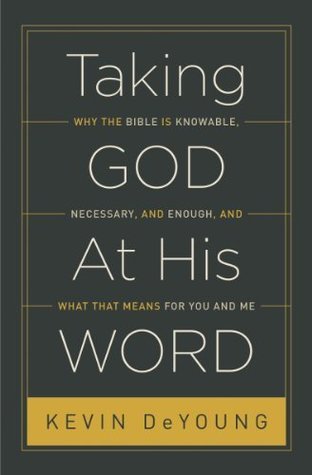More on this book
Community
Kindle Notes & Highlights
Read between
December 18 - December 22, 2020
Law, testimonies, precepts, statutes, commandments, rules, promises, word—this language appears in almost every verse, and often more than once in the same verse. The terms have different shades of meaning (e.g., what God wants, or what God appoints, or what God demands, or what God has spoken), but they all center on the same big idea: God’s revelation in words.
In effect, I’m starting this book with the conclusion. Psalm 119 is the goal. I want to convince you (and make sure I’m convinced myself) that the Bible makes no mistakes, can be understood, cannot be overturned, and is the most important word in your life, the most relevant thing you can read each day.
You can’t establish the supreme authority of your supreme authority by going to some other lesser authority. Yes, the logic is circular, but no more so than the secularist defending reason by reason or the scientist touting the authority of science based on science. This doesn’t mean Christians can be irrational and unreasonable in their views, but it does mean our first principle is neither rationality nor reason. We go the Bible to learn about the Bible because to judge the Bible by any other standard would be to make the Bible less than what it claims to be.
The phrase “concursive operation” is often used to describe the process of inspiration, meaning that God used the intellect, skills, and personality of fallible men to write down what was divine and infallible. The Bible is, in one sense, both a human and a divine book. But this in no way implies any fallibility in the Scriptures. The dual authorship of Scripture does not necessitate imperfection any more than the two natures of Christ mean our Savior must have sinned. As Calvin says about the prophets, “[they] dared not to announce anything of their own, and obediently followed the Spirit as
...more
You can use the word of God to come to wrong conclusions, but you cannot find any wrong conclusions in the word of God.
Have you ever wondered if the Bible is really able to help you with your deepest problems? Have you struggled to know what to do with your life, and wished you had some special word from the Lord? Have you ever thought to yourself that the biblical teaching on sexuality needs updating? Have you ever wished for a more direct, more personal revelation than what you get from slowly reading through the Bible? Have you ever secretly wanted to add something to the word of God—you know, just to make things safer? Have you ever wanted to take something away to make the Bible more palatable? Have you
...more
A great intro to the sufficiency of scripture. Hi hits many Of the most important questions which find their answer in the fish sufficiency have scripture. A whole lesson could be based off of Teaching on sufficiency and then briefly demonstrating and answer to each of these questions.
(WCF 1.7)
This passage perfectly demonstrates what it means to affirm the authority of the Bible. When it says the Bereans were “examining the Scriptures daily to see if these things were so” (v. 11), the implication is that if the Scripture said it, they would believe it. And if they couldn’t find Paul’s teaching confirmed in and consistent with the Scripture, they would reject Paul’s teaching. The written word of God was their authority. It had the last word. It was the final word, after which no other word would be necessary, and contrary to which no other word would be believed.
(WCF 1.10)
I sympathize with Christians who struggle to reconcile what they hear from scientists and what they see in the Bible about a particular issue. We should not be quick to dismiss these questions. It is possible to read the Bible wrongly. It is possible for the church to miss the mark for a long time. But every Christian should agree that if the Bible teaches one thing and scientific consensus teaches something else, we will not ditch the Bible.
But surely it is the mark of a Christian to believe everything the Bible teaches no matter who says it can’t be so. Academic journals are not infallible, let alone high school textbooks or fifteen-second sound bites. As Christians we must always be willing to change our minds when we see that we have misread the Scriptures, but that is a far cry from setting aside the Scriptures because for the last five years—or fifty years or a hundred and fifty years—some scientists have informed us that we can’t believe in the historicity of Adam or that the universe was created out of nothing by the word
...more
But given everything we have already seen about a biblical doctrine of Scripture, we have no reason to be intimidated by difficulties and apparent discrepancies in the Bible. Many of them are easily explained. Most of the rest of them have good, plausible solutions. And for the few humdingers that are left, there are possible explanations, even if we aren’t sure that we’ve found the right one yet. Our confidence in the Bible is not an irrational confidence. The findings of history, archaeology, and textual criticism give us many reasons to trust the Old and New Testaments. But more than all
...more
(WCF 1.1).


